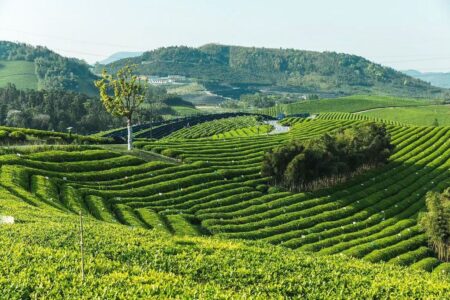Foreign Tea Brands Eye Poland

With a booming tea-consuming market that shows no signs of slowing, foreign tea brands are expanding production capacities in Poland.
By Jaroslaw Adamowski
Twinings has unveiled plans to invest approximately PLN zł85 million (USD $24 million) to expand the output capacity of its production facility in Swarzędz, in Poland’s western region of Wielkopolska.
The investment by the UK-based tea brand is to be carried out by the end of June 2020, allowing the company to create 15 new jobs in Swarzędz, increasing the facility’s total workforce to about 307 employees, according to the information obtained by local daily Puls Biznesu.
Investments in Production Capacities
“The construction permission has been awarded for a completely new project,” said Krzysztof Kielec, the president of the Kostrzyn-Slubice special economic zone (KSSEZ) where the new facility is to be launched. “The investment will allow for the acquisition of machinery to produce tea and build an automatized storage facility.”
The Swarzędz plant is operated by the British group’s local subsidiary, R Twining and Company Sp zoo (Ltd), which was set up in Poland in 2008. The company obtained its first construction permission in 2010 when it declared plans to invest between PLN zł150 and zł190 million (USD $42.3 to $53.6 million) in establishing a new factory and creating about 240 new jobs. These initial plans were exceeded, as in total, the investment in Swarzędz was developed under a project worth zł300 million ($84.7 million), generating more than 290 jobs at the plant.
Situating the new facilities in the KSSEZ will enable Twinings to receive preferential tax treatment for its investment. Poland’s 14 special economic zones host a significant share of the country’s foreign investments. Investors declare the minimum amount of jobs they plan to create at their designed factories, pledging to maintain them for a determined number of years, and the minimum amount they aim to invest, and in return, they benefit from preferential tax treatment for their investments, and can acquire state support for their manufacturing projects.
According to Article 12 of Poland’s law on the economic zones, “The revenues generated from economic activities within the zones under an obtained license…are exempt from the income tax.” The allocated state aid depends on the level of the region’s economic development. It can range between 15 percent and 50 percent of the investment’s value.
In addition to the British tea brand, other foreign players are making efforts to raise their tea production capacities in the Polish market. These include German tea producer Teekanne, which recently opened a new plant in southern Poland. The German company said that the Polish facility was fitted with new generation machinery, and it will supply a number of markets throughout the region.
Teekanne has been active in the Polish market since 1992, and in December, to mark the 25th anniversary of its presence in the country’s tea industry, the company officially launched its new plant. Located at the 7R Kraków Kokotów-Brzegi industrial park, on the outskirts of Poland’s second largest city, Kraków, the factory will allow Teekanne to raise its output to as much as 1.3 billion tea bags per year.
“Moving the production facility of Teekanne Poland to a new location is a milestone for the company’s development in the largest market of Central-Eastern Europe,” said Bernhard Zoller, the president of Teekanne Poland. “The industrial park…was selected, among others, owing to its attractive location, which will allow us to effectively distribute our products. The teas made at the Kraków plant are not only intended for shelves at Polish stores, but also for export sales to other Central-Eastern European markets.”
The factory’s product portfolio consists of more than 120 teas. The plant was constructed as a build-to-suit (BTS) facility.
Positive Market Outlook
Meanwhile, London-based global market intelligence firm, Euromonitor International, claims that the value of Poland’s tea market is expected to reach PLN zł2.37 billion (USD $669 million) by 2021. This would represent a 7.7 percent increase compared with its estimated value of zł2.2 billion ($621 million) last year. The international consultancy expects that the growth trend in the coming years will be driven by the strengthening demand for healthy variants of green tea, as well as fruit and herbal tea.
“Tea continued to see a good performance in 2016 both in volume and value terms. Regardless of the maturity of tea, it is possible to identify promising categories like green tea, fruit/herbal tea and organic varieties of black, fruit/herbal and green tea. This is possible thanks to the ongoing healthy lifestyle trend, which is becoming increasingly important for Poles – especially women, who appreciate the positive health features of tea the most,” Euromonitor stated in its 2017 market report. The report also noted that “organic products in comparison with their regular variants have the advantage of being eco-friendly, and for that reason they are growing faster in terms of retail value sales (eg organic fruit/herbal tea grew by 7 percent while standard fruit/herbal tea recorded current value growth of 3 percent).”
While the demand for fruit and herbal teas has been posting significant growth over the past years, data obtained by local business news site Portalspozywczy.pl indicates that black tea remains the most popular type of tea in the Polish market, with about 80 percent of the country’s inhabitants admitting they drink this beverage regularly.
“Polish consumers most often reach for black tea. In the same time, we start to see a need [among consumers] to try non-standard tastes. The consumption of herbal and functional teas is also on the rise, which is a result of the popularity of the ecological and healthy lifestyle,” said Evangelos Evangelou, the president of the management board of local tea producer Herbapol Lublin.
The company is based in Lublin, in Poland’s southeastern part, and its history dates back to 1949. Evangelou said that within the Polish tea market, Herbapol Lublin has a 30 percent stake in the herbal tea segment, a 25 percent share of the country’s fruit tea sales, and a 24 percent stake in the Polish green tea sales. In the red tea segment, the Lublin-based firm holds a stake of 65 percent, and in the functional tea segment, a 67 percent sales share.
It is noteworthy that, in addition to the high domestic demand for tea, Poland-based producers have also been expanding their foreign sales. In 2016, the country’s tea industry exported products worth about PLN zł764 million (USD $215.6 million), an increase of 34.7 percent compared to foreign sales of zł567 million ($160 million) reported for 2012, according to figures from the state-run Central Statistical Office (GUS).
Poland is also a major importer of tea, with imports of 35,610 tonnes of tea in 2016. In 2016, the country’s tea imports were worth some PLN zł419 million (USD $118.3 million), as indicated by data from the GUS.
In addition to Twinings and Teekanne, Poland hosts tea factories of other major global producers, including Unilever, producer of Lipton and Saga brands, and Tata Global Beverages, which offers Tetley and Vitax brands. The latter company owns a plant close to Poznań, in western Poland, where its local offshoot, Tata Global Beverages Polska, produces and packages herbal and fruit teas.
Unilever operates a production facility in Katowice, in southwestern Poland, where it produces tea and margarine. The production facility is fitted with a total floorspace of 9,500 square meters, and it consists of production and storage facilities, as well as offices.
Last year, Unilever’s local offshoot, Saga, which is produced in the Katowice plant, led Poland’s tea market with a retail value share of 30 percent. Tata Global Beverage’s subsidiary, Vitax, was ranked second, with a value share of seven percent, followed by Herbapol-Lublin’s Big-Active Sp zoo, which also captured a seven percent share of the Polish tea market, according to figures from Euromonitor.
Jaroslaw Adamowski is a freelance journalist based in Warsaw, Poland. He may be contacted at [email protected].




Good business
I landed up on your blog from Google. Thanks for sharing this article. Looking forward to reading more from you.